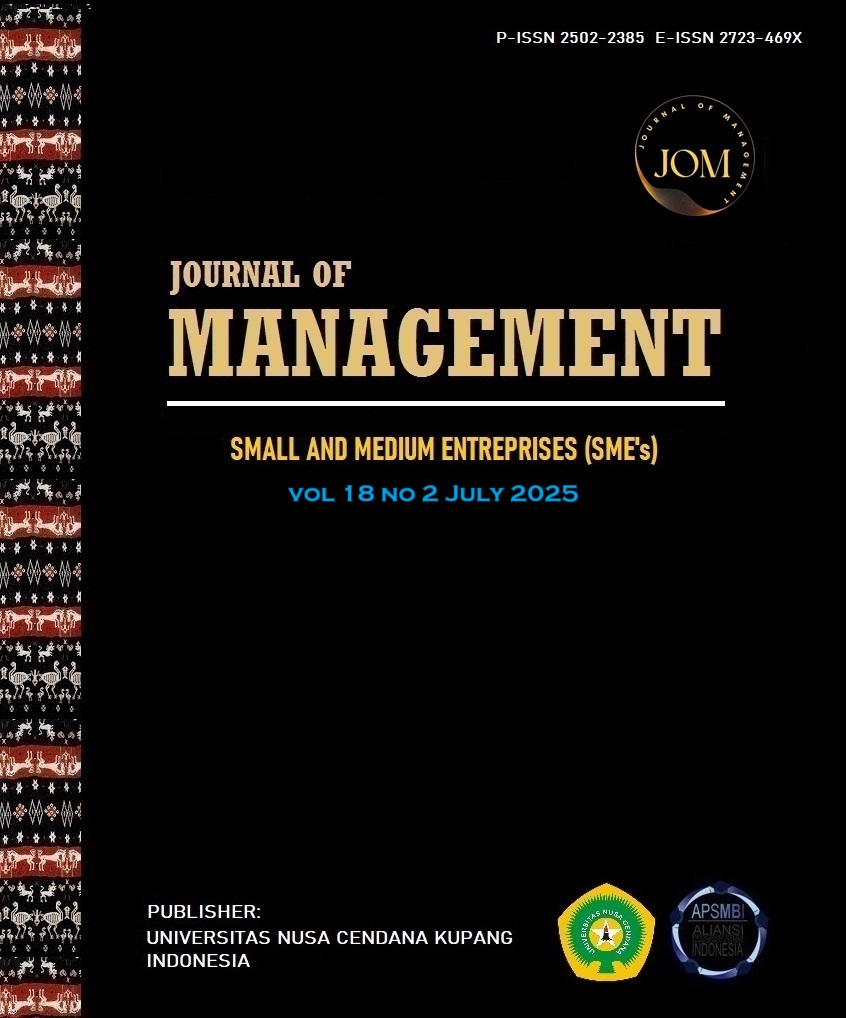THE ROLE OF RELIGIOSITY AS MODERATION IN THE EFFECT OF BRAND IMAGE ON REPURCHASE INTENTION AMONG MCDONALD’S CONSUMERS IN BANDUNG CITY
Abstract
This research examines how brand image influences repurchase intention among McDonald's customers in Bandung City, with religiosity serving as a potential moderating factor. The study employed quantitative methodology, surveying 200 purposively selected participants aged 17-45. The findings indicate that brand image has a negative effect on repurchase intention, while religiosity does not significantly moderate this relationship. Despite a strong brand image, repurchase intention remains low due to contextual sensitivities. These results highlight the importance of integrating religiosity-related considerations into marketing strategies during global geopolitical tensions.
Keywords: Brand Image; Repurchase Intention; Religiosity
Downloads
References
Allport, G. W., & Ross, J. M. (1967). Personal religious orientation and prejudice. Journal of Personality and Social Psychology, 5(4), 432–443.
https://doi.org/10.1037/h0021212
Aquino, K., & Reed, A. (2002). The self-importance of moral identity. Journal of Personality and Social Psychology, 83(6), 1423–1440. https://doi.org/10.1037/0022-3514.83.6.1423
Baron, R. M., & Kenny, D. A. (1986). The moderator–mediator variable distinction in social psychological research: Conceptual, strategic, and statistical considerations. Journal of Personality and Social Psychology, 51(6), 1173–1182. https://doi.org/10.1037/0022-3514.51.6.1173
Bukhari, S. F. H., Woodside, F. M., Hassan, R., Shaikh, A. L., Hussain, S., & Mazhar, W. (2019). Is religiosity an important consideration in Muslim consumer behavior. Journal of Islamic Marketing, 10(4), 1288–1307. https://doi.org/10.1108/JIMA-01-2018-0006
Delener, N. (1994). Religious Contrasts in Consumer Decision Behaviour Patterns: Their Dimensions and Marketing Implications. European Journal of Marketing, 28(5), 36–53. https://doi.org/10.1108/03090569410062023
Donahue, M. J. (1985). Intrinsic and extrinsic religiousness: Review and meta-analysis. Journal of Personality and Social Psychology, 48(2), 400–419. https://doi.org/10.1037/0022-3514.48.2.400
Essoo, N., & Dibb, S. (2004). Religious Influences on Shopping Behaviour: An Exploratory Study. Journal of Marketing Management, 20(7–8), 683–712. https://doi.org/10.1362/0267257041838728
Fairchild, A. J., & MacKinnon, D. P. (2009). A General Model for Testing Mediation and Moderation Effects. Prevention Science, 10(2), 87–99. https://doi.org/10.1007/s11121-008-0109-6
Hair, F. J., Black, C. W., Babin, J. B., & Anderson, E. R. (2019). Multivariate Data Analysis (Eighth Edition). Annabel Ainscow.
Hellier, P. K., Geursen, G. M., Carr, R. A., & Rickard, J. A. (2003). Customer repurchase intention. European Journal of Marketing, 37(11/12), 1762–1800. https://doi.org/10.1108/03090560310495456
Kahneman, D., & Tversky, A. (1979). Prospect Theory: An Analysis of Decision under Risk. Econometrica, 47(2), 263. https://doi.org/10.2307/1914185
Keller, K. L. (1993). Conceptualizing, Measuring, and Managing Customer-Based Brand Equity. Journal of Marketing, 57(1), 1. https://doi.org/10.2307/1252054
Keller, K. L., & Swaminathan, V. (2019). Strategic Brand Management Building, Measuring and Managing Brand Equity (5th Global Edition). Pearson.
Klein, J. G., Smith, N. C., & John, A. (2004). Why We Boycott: Consumer Motivations for Boycott Participation. Journal of Marketing, 68(3), 92–109. https://doi.org/10.1509/jmkg.68.3.92.34770
Kotler, P., & Keller, K. L. (2016). Marketing Management (15e ed.). Pearson Education.
Kotler, P., Keller, K. L., & Chernev, A. (2021). Marketing Management (16th ed.). Pearson Education.
Liputan 6. (2024, September 13). 10 Negara Islam Terbesar di Dunia Berdasar Populasi 2024, Indonesia Tak Lagi Berada di Puncak. Https://Www.Liputan6.Com/Hot/Read/5701027/10-Negara-Islam-Terbesar-Di-Dunia-Berdasar-Populasi-2024-Indonesia-Tak-Lagi-Berada-Di-Puncak.
Marcelo, S. H., Ngatno, N., & Farida, N. (2024). Pengaruh Kualitas Produk Terhadap Minat Beli Ulang yang Dimoderasi Gaya Hidup (Studi Pada Konsumen Celana Jeans Levi’s Gerai Mall Paragon Kota Semarang). Jurnal Ilmu Administrasi Bisnis, 13.
Murjana, D., & Kesuma, T. (2024). Pengaruh Brand Image dan Kualitas Produk Terhadap Minat Beli Produk HNI HPAI dengan Religiusitas sebagai Variabel Mediasi di kota Lhoksemawe. 6.
Nursaidah, N. F., & Nurtjahjadi, E. (2024). Citra Merek dan Kualitas Produk terhadap Minat Beli Ulang pada Teh Pucuk Harum di Kota Bandung. Journal of Management and Bussines (JOMB), 6(4), 1544–1553.
https://doi.org/10.31539/jomb.v6i4.10239
Purnama, B. (2024, July 3). Survei: Boikot Sukses Gerus Penjualan Produk Terafiliasi Israel di Indonesia. Mediaindonesia.Com.
https://mediaindonesia.com/humaniora/682246/survei-boikot-sukses-gerus-penjualan-produk-terafiliasi-israel-di-indonesia
Ratasuk, A., & Gajesanand, S. (2020). Factors Influencing Brand Image and Customer Repurchase Intention: The Case of Coffee Chain Shops Located in Gas Service Stations in Bangkok. University of the Thai Chamber of Commerce Journal Humanities and Social Sciences, 40(3), 171–188. https://so06.tci-thaijo.org/index.php/utccjournalhs/article/view/241417
Saini, S., & Kumar, R. (2023). Effect of Religiosity on Consumer Decision-making: A Serial Mediation Model. FIIB Business Review.
https://doi.org/10.1177/23197145231188624
Sekaran, U., & Bougie, R. (2017). Metode Penelitian untuk Bisnis (6th ed.). Salemba Empat.
Stone, J. (1991). A Theory Of Religion. Religious Studies, 27(3), 337–351. https://doi.org/10.1017/S003441250002103X
Sudaryanto, S., Hanim, A., & Utari, W. (2020). Behaviour on Repurchase Intention in a Moslem Ethnic Store in Indonesia. International Journal of Innovation, Creativity and Change, 13(12), 1341–1355.
Sugiyono. (2019). Metode Penelitian & Pengembangan Research and Development. Alfabeta.
Top Brand Award. (2024). Situs Online Reservasi Online.
Yoanda, D., & Adialita, T. (2024). Pengaruh Citra Merek dan Harga Terhadap Minat Beli Ulang yang Dimediasi oleh Kepuasan Pelanggan Sunscreen Nivea di Kota Bandung. Journal of Economic, Business and Accounting.
Zhang, Y. (2015). The Impact of Brand Image on Consumer Behavior: A Literature Review. Open Journal of Business and Management, 03(01), 58–62. https://doi.org/10.4236/ojbm.2015.31006
Zou, H., Qureshi, I., Fang, Y., Sun, H., Lim, K. H., Ramsey, E., & McCole, P. (2023). Investigating the nonlinear and conditional effects of trust—The new role of institutional contexts in online repurchase. Information Systems Journal, 33(3), 486–523. https://doi.org/10.1111/isj.12410

 Ichsan Wicaksono(1*)
Ichsan Wicaksono(1*)



